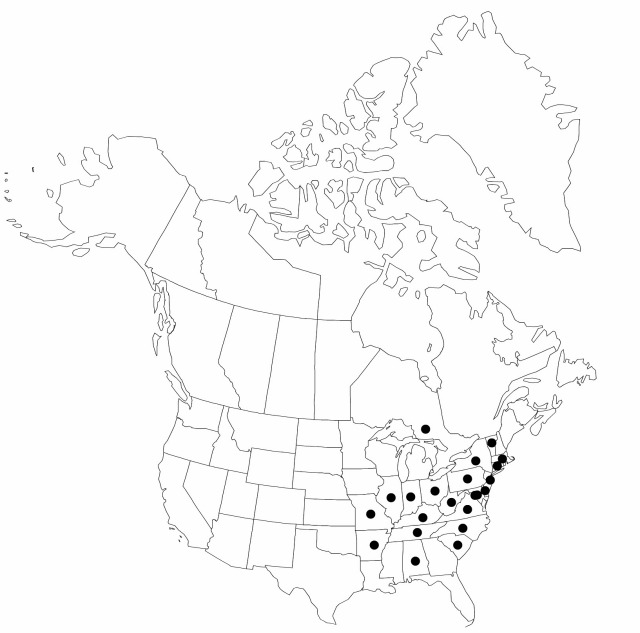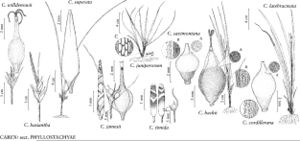Carex willdenowii
Sp. Pl. 4(1): 211. 1805.
Culms erect or spreading, (3.1–)8.2–29.7 cm, 0.4–0.9 of total plant height. Leaves: basal sheaths pale to medium brown; blades green, exceeding culms, 1.3–3.2 mm wide, herbaceous, margins green, smooth or slightly scabrous. Lateral spikes (0–)2–4, basal, on widely spreading to nodding peduncles. Terminal spike with staminate portion 3–29-flowered, 3.4–8.6(–10.3) × 0.7–1.4 mm; pistillate portion 3–9-flowered. Pistillate scales green, margins hyaline, white, often with reddish brown tinge, 1.6–2.22 mm wide, not more than 1.5 times as wide as and not concealing perigynia, apex attenuate into green awns; distal scales with hyaline margins 0.3–0.8 mm, apex acute, awnless. Staminate scales green or tinged with brown subapically, 1.4–2.8 × 1.8–2.2 mm, margins free but enfolding scales above, hyaline, white, apex obtuse, erose. Anthers 0.9–1.1 mm. Perigynia 3–9 per spike, pale green to olive or pale brown, unspeckled, narrowly ovoid to lance-ovoid, (4.5–)4.9–5.7(–6.5) × 1.2–1.7 mm, 1.2–2.2 times as long as wide, tightly enveloping achenes, apex gradually tapering; beak (1.7–)1.9–2.6(–2.8) mm, scabrous. Stigmas filiform, flexuous, long, slender, strongly papillose. Achenes brown, oblong, (1.8–)2.1–2.5(–2.6) × (1.2–)1.3–1.5(–1.6) mm. 2n = 62, 78.
Phenology: Fruiting spring–summer (late Apr–late Jul).
Habitat: Acidic, dry mesic, open, oak-dominated woodlands, often on ridges and slopes
Elevation: 50–900 m
Distribution

Ont., Ala., Ark., Conn., Del., D.C., Ill., Ind., Ky., Md., Mass., Mo., N.J., N.Y., N.C., Ohio, Pa., S.C., Tenn., Vt., Va., W.Va.
Discussion
The Carex willdenowii group (C. willdenowii, C. basiantha & C. superata) differs from the other members of the section in having asynchronous spike production, resulting in a protracted fruiting season (R. F. C. Naczi et al. 1998).
Selected References
None.
